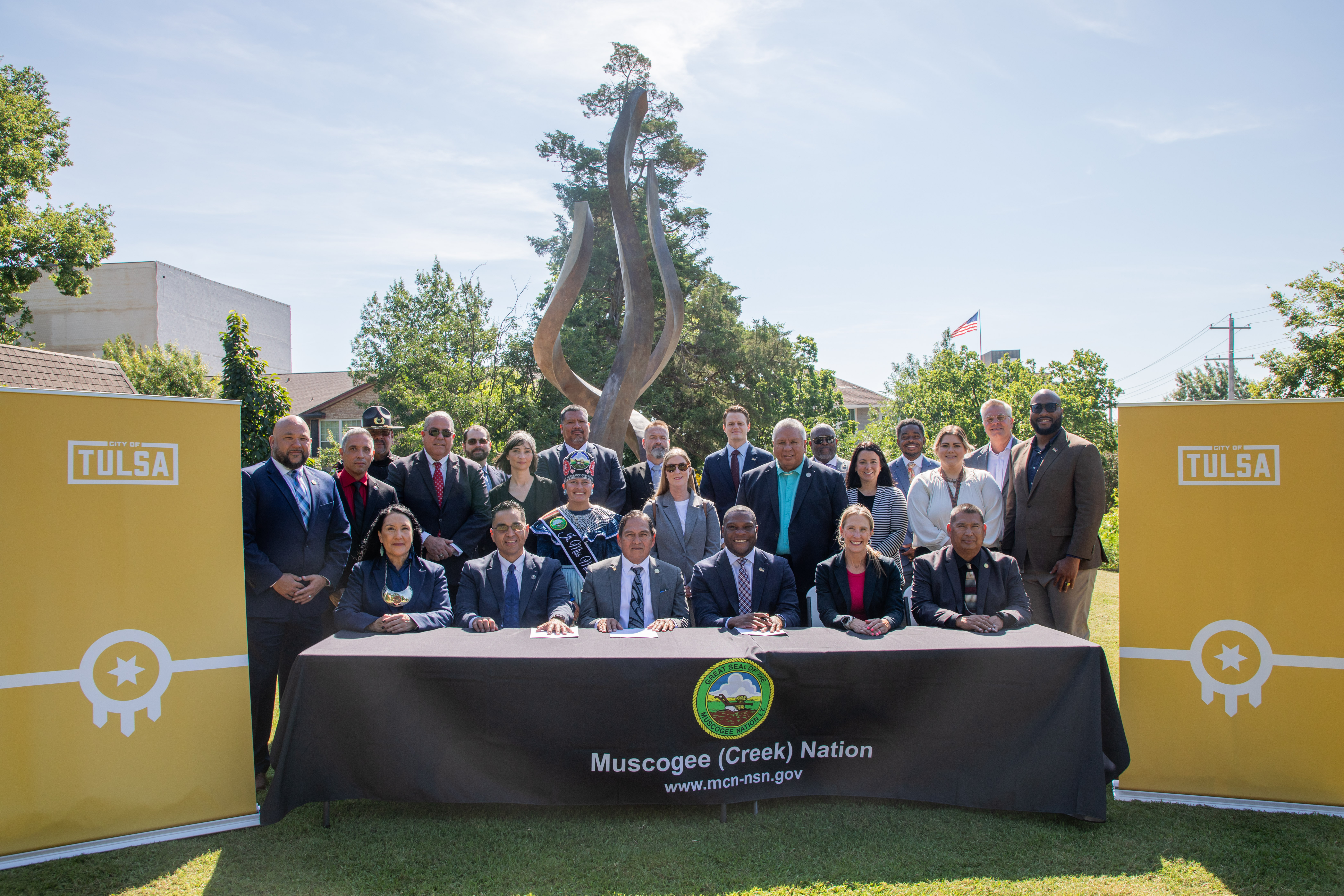
- Details
- By Native News Online Staff
Muscogee Nation Principal Chief David Hill and Tulsa Mayor Monroe Nichols have announced a settlement agreement between the City of Tulsa and the Muscogee Nation, ending ongoing litigation in favor of forward-looking cooperation.
Under the agreement, the City will continue its current enforcement practices, but municipal criminal cases involving tribal citizens—of any federally recognized tribe—will be transferred to the Muscogee Nation tribal court, provided the incident occurred within Tulsa city limits and within the Muscogee Reservation boundaries.
The agreement does not apply to state or federal cases, which remain unchanged. It also preserves the Tulsa Police Department’s authority to enforce local laws and conduct traffic stops, regardless of tribal status.
A joint working group will be formed within 30 days to address remaining procedural matters related to public safety, including booking, detention, mental health services, diversion programs, lab testing, and more. This group will deliver a public report within eight months.
Mayor Nichols expressed appreciation for the Nation’s cooperation:
“First, I want to thank Principal Chief David Hill and the Muscogee Nation for entrusting us with the work ahead and for the good faith efforts in creating a path forward that has not been accomplished in more than five years,” said Nichols. “The collaboration and communication between our governments has been tremendous. This agreement is a major step toward fulfilling my pledge to co-govern with our tribal partners and make Tulsa the safest big city in the country. We are stronger together, and we can show the nation how municipalities and tribal governments can work together to create better outcomes for all our residents.”
Principal Chief Hill also emphasized the importance of this milestone:
“As we approach the five-year anniversary of the McGirt decision, I’m proud of the progress the Nation has made in expanding our law enforcement and judicial systems. Our ability to provide robust public safety is strengthened when we cooperate with local and state agencies. This agreement with Tulsa demonstrates that partnership in action,” Hill said. “I applaud Mayor Nichols for choosing collaboration over litigation. While this agreement marks progress, the real work of implementation begins now, and I look forward to continuing this important work.”
Cherokee Nation Principal Chief Chuck Hoskin Jr. also praised the move:
“I applaud the City of Tulsa and Muscogee Nation for reaching a resolution that protects tribal sovereignty and enhances public safety for all,” said Hoskin. “Mayor Nichols and Chief Hill have shown true leadership. In stark contrast, Governor Kevin Stitt continues to show a fundamental misunderstanding of tribal sovereignty. While he remains on the wrong side of history, we are creating a modern path for co-governance.”
Key Agreement Highlights:
-
Tribal Sovereignty Protected: Municipal cases involving tribal citizens will go to Muscogee Nation court if the incident occurs within the Reservation portion of Tulsa.
-
No Change to State/Federal Cases: Violent crimes still referred to the U.S. Attorney’s Office, as is current practice.
-
Law Enforcement Authority Maintained: Tulsa Police retain full authority to enforce city laws and conduct traffic stops regardless of a person's tribal affiliation.
-
Initial Enforcement Unchanged: Police interactions and citations will proceed as normal, with cases transferred to tribal court as applicable.
Working Group Goals:
-
Finalize processes for handling municipal cases within tribal jurisdiction.
-
Address booking, detention, extradition, court logistics, mental health support, property handling, and inter-agency communication.
-
Produce a comprehensive public report within eight months.
What the Agreement Does Not Do:
-
Create special rules for tribal citizens.
-
Impede police or local officials from protecting the community.
-
Limit the Tulsa Police Department’s ability to enforce laws.
-
Affect or relate to recent incidents of gun violence.
-
Make Oklahoma "less safe."
The agreement includes ongoing evaluation and feedback to ensure the partnership remains effective and responsive to community needs.
More Stories Like This
50 Years of Self-Determination: How a Landmark Act Empowered Tribal Sovereignty and Transformed Federal-Tribal RelationsThe Shinnecock Nation Fights State of New York Over Signs and Sovereignty
Navajo Nation Council Members Attend 2025 Diné Action Plan Winter Gathering
Ute Tribe Files Federal Lawsuit Challenging Colorado Parks legislation
NCAI Resolution Condemns “Alligator Alcatraz”
Help us defend tribal sovereignty.
At Native News Online, our mission is rooted in telling the stories that strengthen sovereignty and uplift Indigenous voices — not just at year’s end, but every single day.
Because of your generosity last year, we were able to keep our reporters on the ground in tribal communities, at national gatherings and in the halls of Congress — covering the issues that matter most to Indian Country: sovereignty, culture, education, health and economic opportunity.
That support sustained us through a tough year in 2025. Now, as we look to the year ahead, we need your help right now to ensure warrior journalism remains strong — reporting that defends tribal sovereignty, amplifies Native truth, and holds power accountable.
 The stakes couldn't be higher. Your support keeps Native voices heard, Native stories told and Native sovereignty defended.
The stakes couldn't be higher. Your support keeps Native voices heard, Native stories told and Native sovereignty defended.
Stand with Warrior Journalism today.
Levi Rickert (Potawatomi), Editor & Publisher


